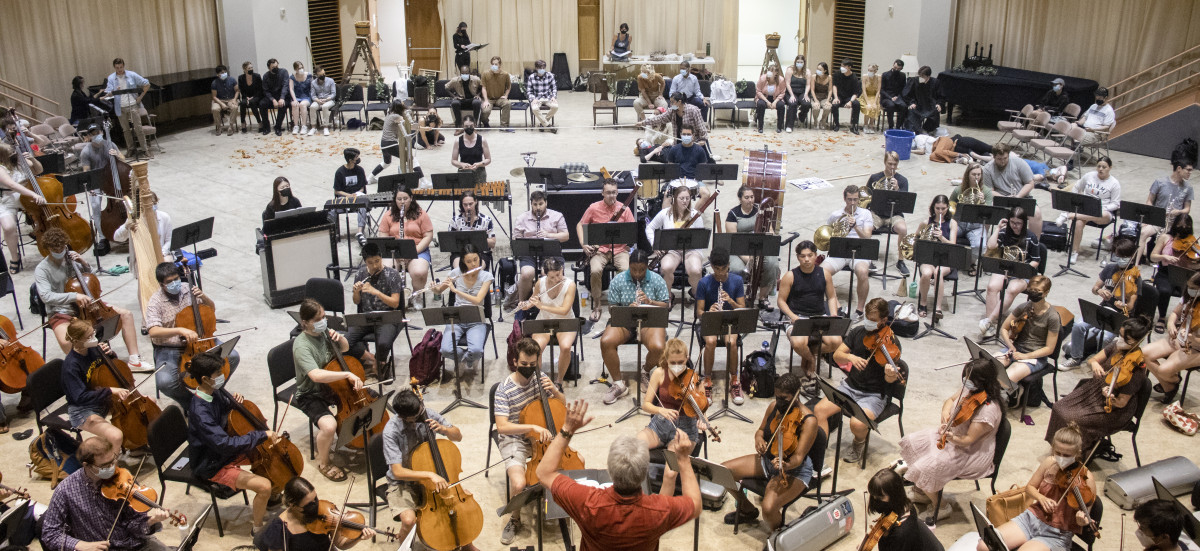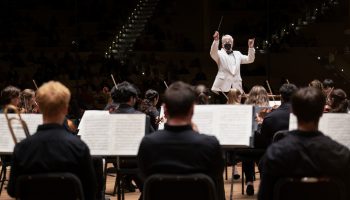Chautauqua Opera Conservatory Director Marlena Malas and stage director John Giampietro originally planned to stage Leoš Janáček’s The Cunning Little Vixen during the 2020 season, but shelved the production because of the COVID-19 pandemic and the virtual season ahead of them and their students. But at 8:15 p.m. Monday, Aug. 8 on the Amphitheater stage, the Opera Conservatory and the Music School Festival Orchestra finally get to collaborate on this beloved opera.
The Cunning Little Vixen tells the story of a female fox cub, also called a vixen, that is taken from her woods by a forester who ties her up in his backyard. When she gets older, she escapes. It explores the interactions between the animal and human worlds.
While the lyrics are originally in Czech, the Opera Conservatory decided to perform the English translation, which will mark this the first English opera the conservatory will present in the Amp.
Giampietro and the Opera Conservatory students started rehearsing after the Week Four close of Mozart’s Don Giovanni, around just two weeks ago.
“That’s just a huge challenge, making sure that, in a very compressed period of time, that we’re still telling the story, that the students are still getting an experience of developing character and developing their own self in the roles,” Giampietro said.
Bass-baritone Henry Griffin first saw The Cunning Little Vixen when he was in high school and visited the Manhattan School of Music. It cemented his decision to attend the school.
Griffin was cast to play the role of the Forester, but tested positive for COVID-19. As of Saturday afternoon, Giampietro said he and the cast were finding creative solutions to fill the role.
A novelty of the opera is that some of the singers play the parts of animals, while others are humans. Griffin said at one point, the character of the Forester scratches behind the ears of the Dog, who is played by mezzo-soprano Anna Maria Vacca.
“It explores this interplay between humans and animals,” he said.
The way the Forester interacts with the natural world is controversial, evidenced by his taking of the vixen. Griffin feels that this is an integral aspect of the character to be unpacked.
“I believe I have a connection to the natural world,” Griffin said, “but there’s also a sense, in the Forester’s thinking, that there’s this innate superiority over the natural world, which of course, I personally believe to be wrong.”
When working with the students playing animals, Giampietro explained the approach to acting does not change.
“You don’t approach acting differently if you’re doing a human or an animal,” he said. “You’re still (asking), ‘What am I doing in this scene? What is my objective? Who am I in a relationship with in this scene?’ ”
Giampietro’s method of keeping the acting approach the same between animals and humans mimics the message Janáček tells in the opera.
“The thing that unifies all of it — and is the core idea of the production — is this idea (of) the paths that we take through life and where we are on that path of life,” he said. “Animals have their specific path in life, or humans have our specific path in life. Sometimes those paths cross, but it’s our own, and we walk it.”
This is far from the first time the MSFO and Opera Conservatory have crossed paths. When they first teamed up to produce an opera together, it did not look like what it does now.
“What started out as short, one-act operas that were part of an existing orchestra program have now evolved into full-blown opera productions,” said Timothy Muffitt, the School of Music’s artistic director and MSFO conductor. “It’s just been so exciting and a great experience for our instrumentalists to work in collaboration with singers so closely.”
Muffitt believes Janáček’s music has a strong interconnection of vocals and instruments.
“They almost play an equal role, in a way, where sometimes in operas, the orchestra is just providing a foundation and the singer sings over the top. This is a very closely integrated score,” he said.
When the two are so intertwined, there cannot be a misstep in the music and, in Muffitt’s opinion, Janáček does not miss.
“He has a unique musical language. No one else sounds like him, and this score is a masterpiece,” Muffitt said. “There just isn’t a single note out of place or anything extraneous. It’s really beautifully conceived and crafted.”
Giampietro echoed a deep appreciation for Janáček’s score and is excited to share it with Chautauquans.
“I imagine for a lot of people, (this) may be their first encounter with Janáček, who is my spirit opera composer, and it will be the first time for them to hear this absolutely ravishing score,” he said. “It’s profound and utterly moving, and our students sing it so beautifully.”





